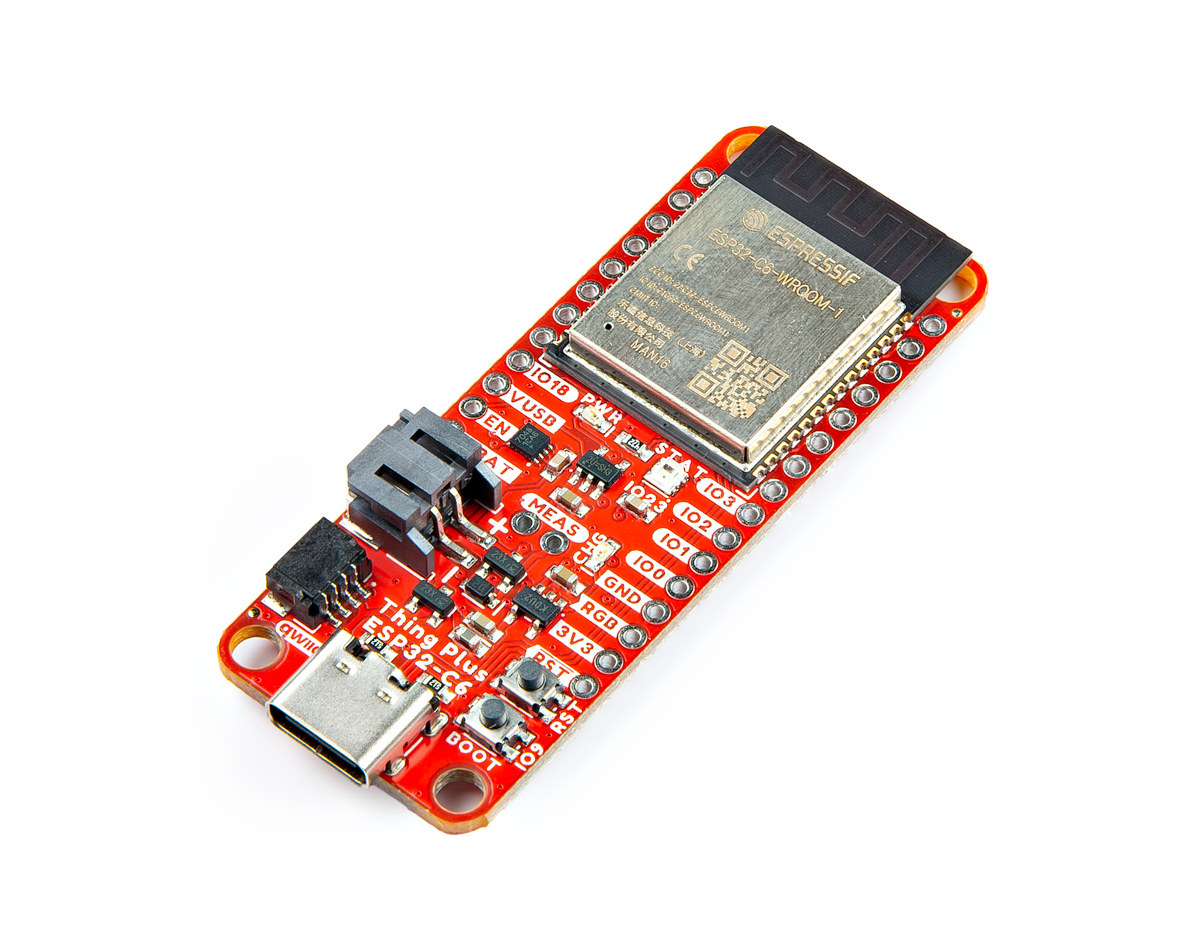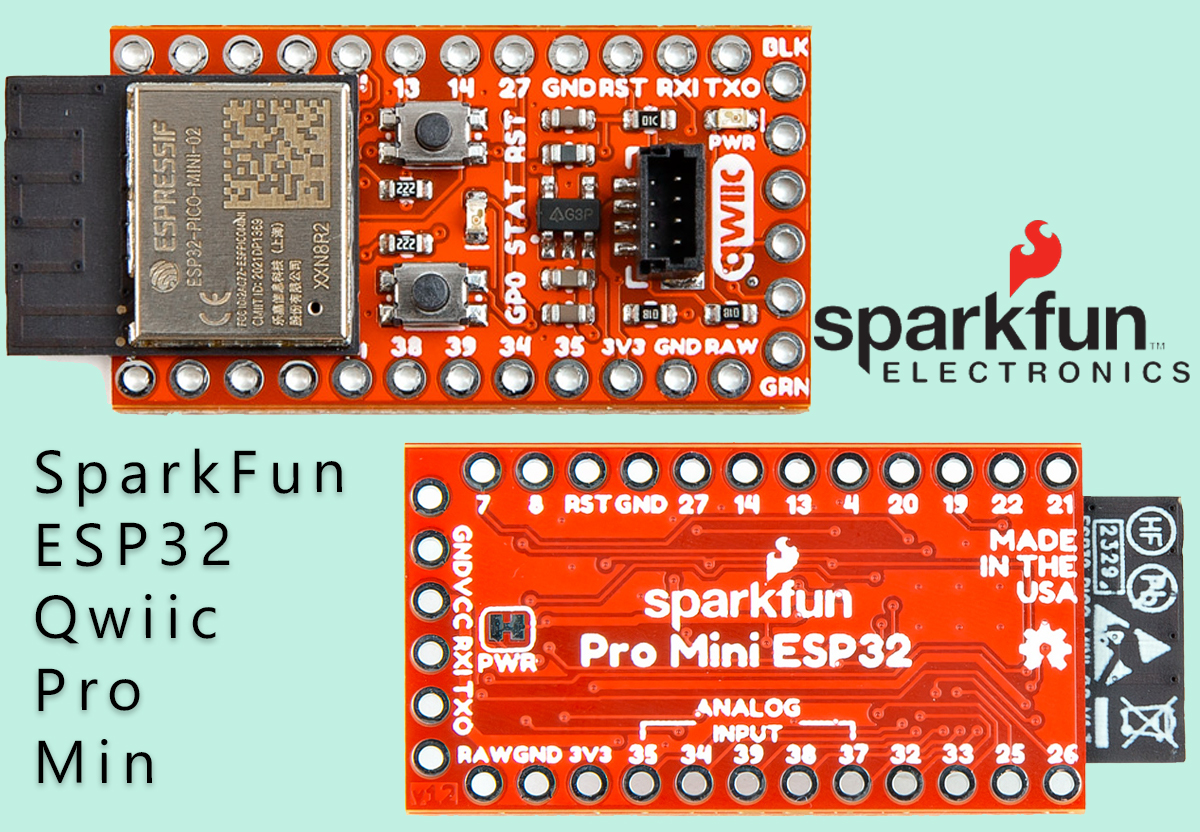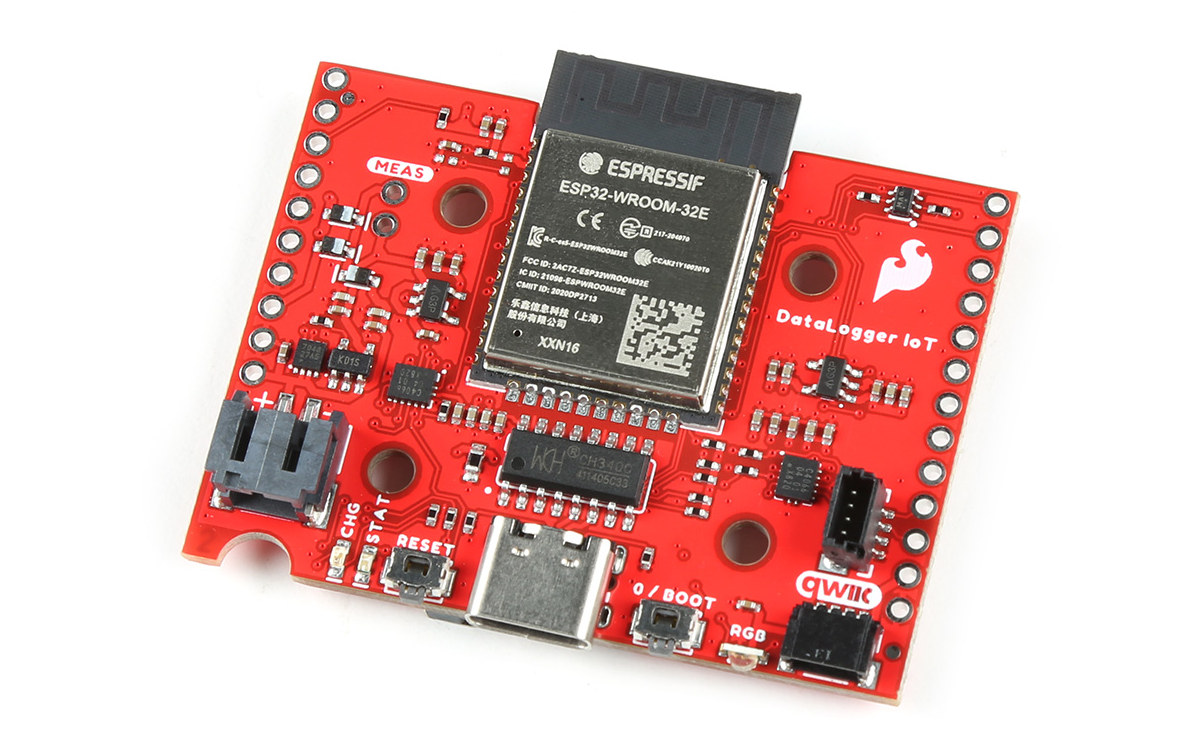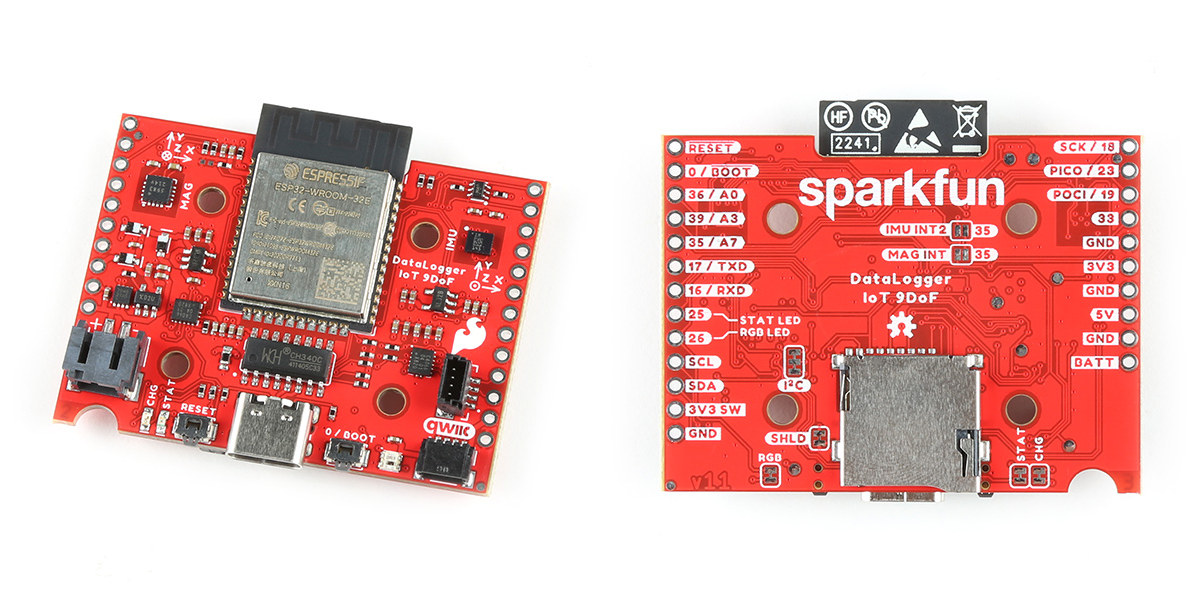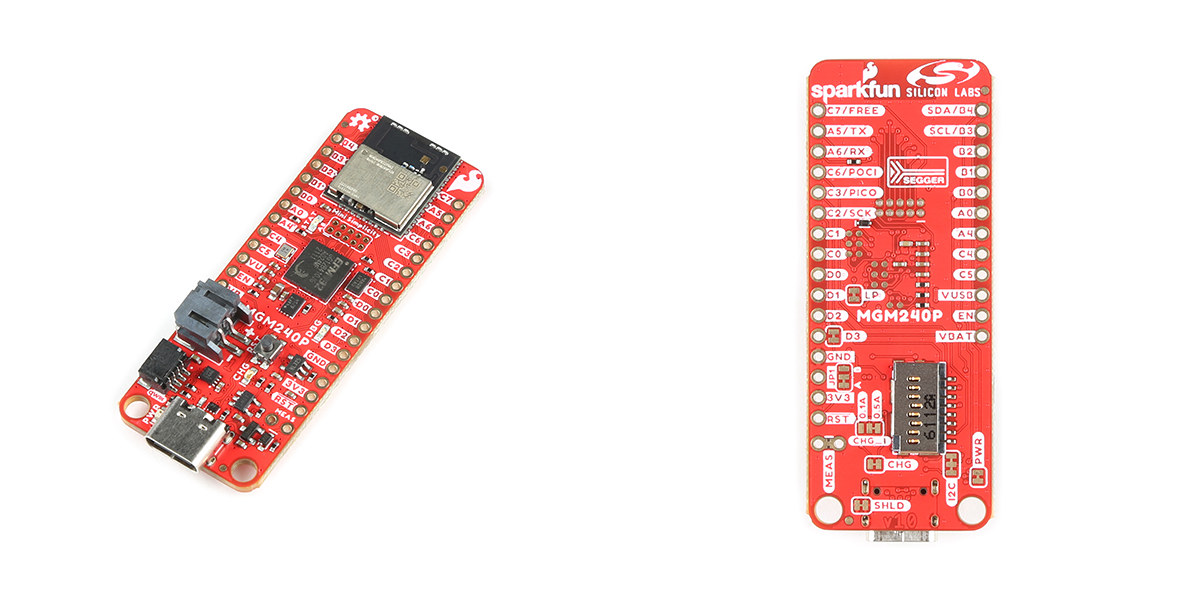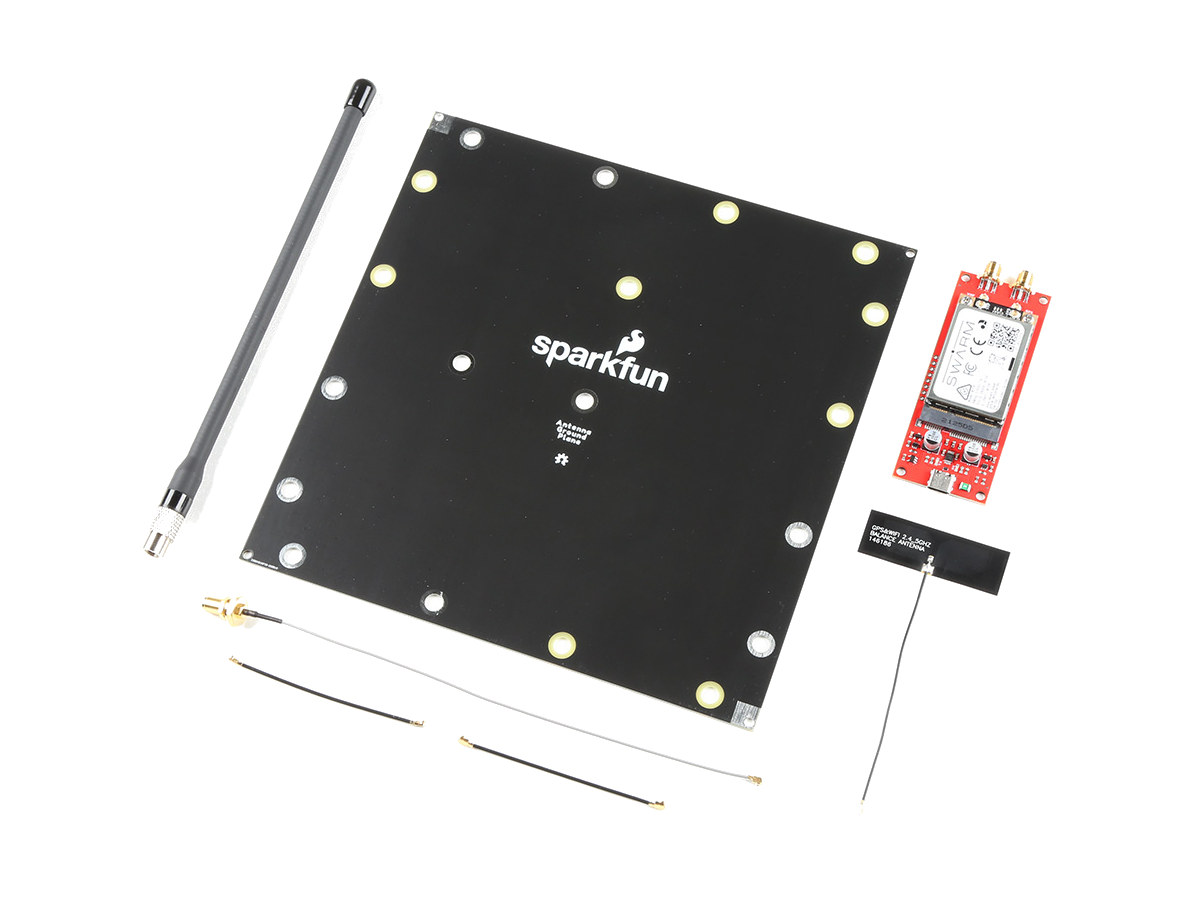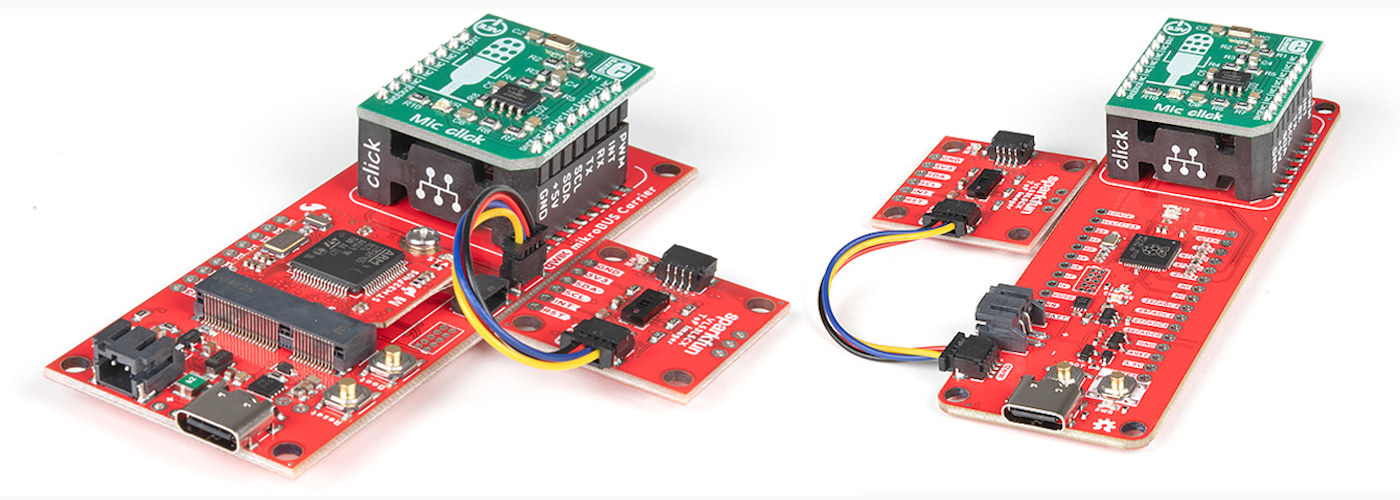SparkFun has launched yet another ESP32-C6 board with the “Thing Plus – ESP32-C6” based on the ESP32-C6-WROOM-1-N16 module with 16MB flash and a PCB antenna and range of I/Os and power options. The board features 28 through holes with up to 23 multi-function GPIOs and a Qwicc connector for expansion, and supports 5V or LiPo battery power through respectively a USB-C port a 2-pin JST connector combined with a charging chip, and a fuel gauge. SparkFun Thing Plus – ESP32-C6 specifications: Wireless module – ESP32-C6-WROOM-1-N16 MCU – ESP32-C6 32-bit single-core RISC-V microcontroller with 2.4 GHz WiFI 6, Bluetooth 5 LE, and 802.15.4 radio (Zigbee and Thread); Matter-compatible Storage – 16 MB flash PCB Antenna Storage – MicroSD card slot USB – 1x USB Type-C port for power and programming Expansion 12-pin + 16-pin headers with 23x multifunctional GPIOs Up to 7x 12-bit ADC channels Up to 2x UART channels (with […]
ESP32 Qwiic Pro Mini is an ESP32 board in Arduino Pro Mini form factor
SparkFun’s latest development board, the ESP32 Qwiic Pro Mini, puts the Espressif ESP32-PICO-MINI-02 on a compact Arduino Pro Mini footprint. It also includes an onboard QWICC connector for easy interfacing with a wide range of sensors and peripherals. We have already covered other Sparkfun dev boards like DataLogger IoT, Datalogger IoT – 9DoF, and SparkFun Thing Plus Matter you can check those out if interested. Like any other ESP32 board, this also uses an ESP32 microcontroller which features a 32-bit dual-core processor, 520kB of SRAM, 2MB of PSRAM, 8MB of flash memory, and 16 kB of additional SRAM in its RTC. It supports Bluetooth 4.2 and BLE and has ADC and DAC, touch detection, PWM, TWAI, Ethernet MAC, UART, SPI, SDIO, I2C, and I2S interfaces. As reported in a Hackster article, the board also features a Qwiic Connector for solderless connections to sensor boards and add-ons, positioned at a 90-degree angle […]
Sparkfun launches cheaper no-code “DataLogger IoT” board compatible with Qwiic modules
Last May, SparkFun introduced the “Datalogger IoT – 9DoF” no-code platform with support for over 50 Qwiic sensor modules and a built-in 9-axis IMU sensor and magnetometer. Taking into consideration that some users may not make use of the built-in sensors, the company decided to launch a cheaper version called the “DataLogger IoT” that can still get data from Qwiic sensor and GPS modules without any programming thanks to the “no-code” Arduino firmware preloaded on the ESP32-WROOM-32E module. SparkFun DataLogger IoT specifications: Wireless module – ESP32-WROOM-32E with: ESP32 dual-core microcontroller 4MB flash 2.4 GHz WiFi and Bluetooth LE connectivity, built-in PCB antenna Storage – MicroSD card slot USB – 1x USB Type-C port for power and configuration via CH340C Expansion – 2x Qwicc I2C connectors for sensors and/or GPS module Misc Boot and Reset buttons Status and charging LED, WS2812 RGB LED Jumpers to enable/disable LEDs, I2C pull-up resistors, and […]
SparkFun “Datalogger IoT – 9DoF” no code platform supports over 50 Qwiic sensor modules
SparkFun “DataLogger IoT – 9DOF” is an ESP32-based data logger board that transfers data to a microSD card or wirelessly to the cloud and comes with firmware that can automatically detect over 50 Qwiic modules without any programming required from the user making it a so-called “no code platform“. The board comes with a 9-axis IMU sensor + magnetometer, and two Qwiic connectors, and the data is stored in CSV or JSON formats on a microSD card or sent to IoT cloud platforms such as Amazon AWS IoT, Microsoft Azure, or Mathworks ThingSpeak using protocols like MQTT or HTTP. SparkFun “Datalogger IoT – 9DoF” specifications: Wireless module – ESP32-WROOM-32E: ESP32 dual-core microcontroller 4MB flash 2.4 GHz WiFi and Bluetooth LE connectivity, built-in PCB antenna Storage – MicroSD card slot Sensors 6-axis IMU accelerometer & gyro (ISM330DHCX) Magnetometer (MMC5983MA) 2x Qwicc I2C connectors for additional sensors USB – 1x USB Type-C […]
SparkFun Thing Plus Matter – MGM240P board supports Matter, Zigbee, OpenThread, and Bluetooth Low Energy 5.3
SparkFun Thing Plus Matter – MGM240P board targets the development of applications using the Matter IoT protocol and features the MGM240P module based on Silicon Labs EFR32MG24 Arm Cortex-M33 wireless microcontroller with an 802.15.4 radio for Zigbee and OpenThread plus a Bluetooth Low Energy (BLE) 5.3 radio. The board also offers two rows of I/Os for upto 21 GPIOs and a Qwiic connector for expansion, another EFRM32 MCU acting as a J-link debugger, a microSD card, and can be powered via USB-C or a LiPo battery. SparkFun Thing Plus Matter – MGM240P specifications: MGM240P wireless module SoC – Silicon Labs EFR32MG24 microcontroller CPU – 32-bit Arm Cortex-M33 @ 39 MHz (MCU/module specs say up to 78 MHz, but maybe it’s clocked lower in this board for some reason, maybe lower power consumption?) Memory/Storage – 1536kB Flash Memory, 256kB RAM Wireless – 802.15.4 wireless protocols (Zigbee and OpenThread) and Bluetooth Low […]
Sparkfun NanoBeacon low power Bluetooth 5.3 beacon module supports Bosch BME280 and BMA400 sensors
Sparkfun NanoBeacon is a module equipped with InPlay IN100 NanoBeacon Bluetooth 5.3 beacon SoC, a Qwicc connector, and a few GPIOs designed to work with Bosch Sensortec BME280 3-in-1 humidity sensor, measuring humidity, air pressure, and ambient temperature, and the BMA400 ultra-low power accelerometer sensor. The IN100 NanoBeacon SoC consumes less than 650nA in sleep mode, supports proprietary, Bluetooth, Google Eddystone, and Apple iBeacon beacon modules, and offers a long range of up to several hundred meters. Sparkfun NanoBoard specifications: Bluetooth Beacon SoC – IN100 NanoBeacon SoC (See datasheet for details) Memory – 4 KB SRAM + 4 Kbit OTP memory Bluetooth 5.3 compliant Beacon Modes: Proprietary, BT, Google Eddystone, and Apple iBeacon compliant 2.4GHz RF frequency band, MedRadio band (2.36GHz) Programming-free and firmware-less design Long-range transmission: up to several hundred meters Security Authentication of beacon ID Privacy of advertising payload Power consumption Sub-uW power consumption for multi-year operation on […]
$200 Swarm M138 kit enables two-way satellite connectivity for IoT projects
Sparkfun has launched a Satellite Transceiver Kit based on the Swarm M138 satellite and GNSS modem that allows low-bitrate two-way connectivity for IoT projects anywhere on earth. Remote IoT applications have benefited from LPWAN standards such as LoRaWAN and NB-IoT, but in some extreme cases coverage may still be challenging, so satellite communication may be the only practical option. It used to be really expensive, but Swarm makes this more affordable, and companies like SigFox and Semtech also have (or had?) plans to use low-earth orbit satellites for their respective LPWAN technologies. Swarm M138 kit content and specifications: Swarm M138 mini PCIe satellite modem and GNSS receiver module MCU – Arm Cortex-M4 microcontroller Up to 1 Kbps data rate, up to 912 bytes packet size Frequency 137-138 MHz (downlink) 148-150 MHz (uplink) Dimensions – 51.0 x 30.0 x 5.3 mm Weight – 9.6 grams Temperature Range – -40°C to +85°C […]
SparkFun Raspberry Pi RP2040 & MicroMod boards take mikroBUS Click expansion boards
We’ve previously written articles about boards featuring the mikroBUS interface supporting thousands of Click expansion boards from Mikroelectronika, and now the company has collaborated with Sparkfun who launched MicroMod and Raspberry Pi RP2040-based boards with a mikroBUS socket, plus Qwicc connectors. Raspberry Pi RP2040 is the well-known dual-core Arm Cortex-M0+ microcontroller found in Raspberry Pi Pico and a range of third-party boards, while Sparkfun MicroMod‘s are M.2 MCU modules with chips from Microchip, Nordic Semi, Ambiq, Espressif Systems, and NXP. Sparkfun RP2040 mikroBUS development board specifications: MCU – Raspberry Pi RP2040 dual-core Cortex M0+ microcontroller up to 133 MHz with 264 KB SRAM Storage – 16MB QSPI flash, MicroSD card socket (on the bottom side) USB – USB Type-C port Expansion mikroBUS Socket 2x Qwiic connectors Thing Plus (or Feather) pin form factor with 18 GPIO pins including up to 4x 12-bit ADC, up to 8x 2-channel PWM, up to […]


